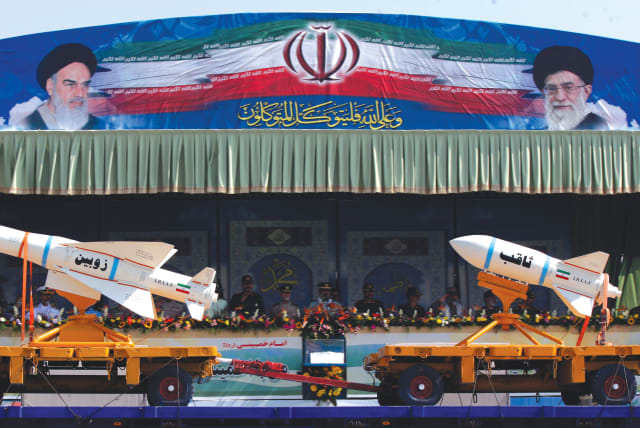The Iranian threat must be addressed at UNGA - opinion

The main challenge for Israel and the countries in the Middle East is to make sure that the Iranian nuclear issue receives the attention it deserves.
The UN General Assembly opened its doors last week, and for the first time since the outbreak of the coronavirus pandemic, the sessions are taking place in person. The 76th gathering of UNGA will in the most part focus on tackling COVID. This issue is of course crucial and a natural one for most world leaders to address. It is a plague that has changed the world order.
However, the main challenge for Israel and the countries in the Middle East is to make sure that the Iranian nuclear issue receives the attention it deserves. We anticipated that the Iranian regime would continue with their double-dealing and announce that they intend to resume nuclear talks in the coming weeks. Yet we must not enable their evil intentions to become an actuality. The Iranians must not be allowed to continue to deceive the nations of the world.
During the five years I served at the UN, I witnessed the fraudulent Iranian system in action. During a visit of Iran’s former leader, Hassan Rouhani, I happened to be seated at a nearby table in one of the UN lounges. I saw live how the Iranian leader convinces world leaders with his “pure” and “peaceful” intentions. Since then, the Iranian nuclear program has progressed and the Iranian spectacle continues.
Israel’s newly elected prime minister, Naftali Bennett, will appear for the first time at the UN General Assembly, one of the world’s most prominent world stages. The prime minister will deliver a speech on the last day of the conference and it is presumed that he will continue to reiterate the clear stance expressed by Israel, as communicated by former prime minister Benjamin Netanyahu, and direct the spotlight on the Iranian nuclear threat that endangers the stability of the region and the world.
The main message of the State of Israel to the attendees of the assembly must be bold and clear. Addressing the corona pandemic is important and the world undoubtedly needs to invest resources to manage this virus. However, there is at least as significant, if not more of a menace that could undermine the delicate stability in the Middle East and globally, and that is the Iranian nuclear threat. The nuclear agreement to which Iran and the original agreement signatories, or the P5+1, may return will not terminate an already advanced nuclear program. It will only serve to bestow international legitimacy to an unrestrained extremist Iranian regime and its treacherous nuclear ambitions.
Throughout my diplomatic career I have learned that many countries talk about the importance of Israel’s security while making decisions that actually weaken our security. Israel must take our enemies’ threats more seriously than our allies’ promises. If this dangerous regime attains the nuclear capabilities to which it aspires it will undoubtedly disturb the delicate balance that exists in the region, and it will be not only Israel and the Middle East region that will suffer. In diplomacy, politeness is maintained but positions should not be surrendered. The State of Israel must reveal the truth clearly and unambiguously that it is impossible to sign an already fractured agreement and simultaneously talk about halting the Iranian nuclear program.
The writer served as Israel’s 17th ambassador to the UN from 2015-2020. He currently serves as chairman of the World Likud.
Jerusalem Post Store
`; document.getElementById("linkPremium").innerHTML = cont; var divWithLink = document.getElementById("premium-link"); if (divWithLink !== null && divWithLink !== 'undefined') { divWithLink.style.border = "solid 1px #cb0f3e"; divWithLink.style.textAlign = "center"; divWithLink.style.marginBottom = "15px"; divWithLink.style.marginTop = "15px"; divWithLink.style.width = "100%"; divWithLink.style.backgroundColor = "#122952"; divWithLink.style.color = "#ffffff"; divWithLink.style.lineHeight = "1.5"; } } (function (v, i) { });
